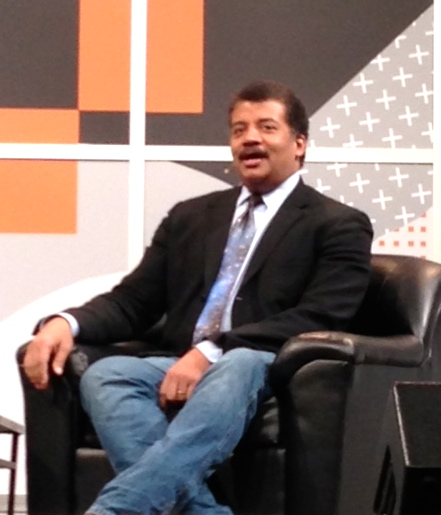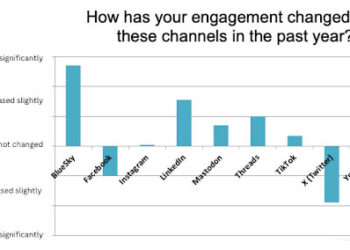While it’s impossible to go to SXSW Interactive and see even one tenth of what is presented, we always leave with some favorites and some new ideas. For the seven of us that attended this year, the favorite without exception was Neil deGrasse Tyson!
Neil takes his role as a science communicator very seriously and, as anyone who has seen Cosmos knows, he’s quite good at it. In his SXSW presentation, he simply and elegantly explained the value of the scientific method, the relative size of the solar system, how and why we look for markers of life throughout the universe, why Pluto isn’t really a planet, and why the Red Bull Mission to the Edge of Space wasn’t nearly as impressive as some would think.
In my opinion, the most significant takeaways were two points that are incredibly relevant to to what we all do every day.
First, in the context of child-rearing, Tyson encouraged the audience to let their children explore their environment. Let them break things!
Have a broken stuff budget and count that as the cost of education for your kids…As adults we have the desire to tell our children the answer but that denies them the experiment.
Organizations would also be well-served to heed this advice. Although we don’t want everything to fall into this category, we learn from the events that do not transpire as we expected. We certainly want to mitigate the risk of “failure,” but the only complete failure is one in which we learn nothing. In fact, it is often the case that in failing to meet our desired objective we gain critical insight into our market and our customers’ needs. There is value in experimentation.
Second, when Tyson was asked how he dealt with those that deny science or take scientific discoveries out of context, his response was that he focuses them on the scientific method. Rather than dispute their conclusions (e.g., the sun is yellow, there is no climate change, etc.), he focuses them on the process. His rationale being that if they follow a trustworthy process their results will be more trustworthy as well.
In business, well-defined process is also crucial. Aside from providing a framework to manage and understand investment and impact, a well-defined process also enables the productive resolution of conflict. It can keep differing opinions focused on facts and outcomes and prevent disagreement from getting personal. This is one reason why we have process, why we create it to manage everything from product launches to software implementations to innovation. (Let us not confuse process with bureaucracy, the latter being an inefficient, value-detracting definition and execution of the former.)
Tyson was also thoroughly entertaining. Some of my favorite quotes included:
Why go to space? Because you know the dinosaurs would have if they could have.
If you found life on Europa what would you call it? It would have to be Europeans.
We define ourselves as intelligent – why, because we came up with the test for that!
If you think there are 9 planets in the solar system, get over it. Don’t be so attached to numbers.
Other SXSW highlights:
Peter W. Singer, Director of the Center for 21st Century Security and Intelligence and a senior fellow in the Foreign Policy program at the Brookings Institute delivered a keynote, Cyberwar: What Everyone Needs to Know. It was not only informative, but also refreshingly rational. There is growing fear about cyber security, yet there is a serious lack of understanding regarding the threat. Very often figures on the number of cyber attacks count the most trivial attempts equally with the most severe and dangerous. He likened it to putting a firecracker in the same class as a nuclear weapon. These statistics encourage fear, but in his words “fear accomplishes nothing.”
Tim Brown, CEO IDEO, and Joi Ito, Director MIT Media Lab, were in a featured session called The Future of Making. Part of the conversation centered around how we learn versus how we are taught. Both speakers advocated learning by doing and experimenting (sensing a theme here with Neil deGrasse Tyson!). As Ito put it:
Education today is about testing, but real mastery is about confidence.
Abbe Don, VP of User Experience for Epocrates, Inc., outlined how Epocrates, and her previous employer, IDEO, successfully used ethnographic research to identify unmet patient and provider needs and build products and services to address them.
There are simply too many great speakers, sessions, and workshops to detail here. This year the healthcare track was very robust and would have been beneficial to any medical publisher. All in all, SXSW once again did not disappoint (except for the horrible mobile app that kept crashing, but that’s another story). If your business is content and technology, and you haven’t gone to SXSW, you should plan to go next year. Let me know if you do!
Discussion
5 Thoughts on "SXSW Interactive: The Annual Pilgrimage"
Ann, I did not know the color of the sun was an issue. Sounds interesting. But I am concerned about your apparent distinction between process and bureaucracy, which I think of as the functioning structure of an organization. Mind you I have done a lot of work streamlining federal bureaucracies, but there has to be structure. I guess you are using the term bureaucracy to refer just to those structures that do not work well, is that it? In that case the challenge is how to recognize them.
Yes, that is it! The way I was using it: process = good structure and bureaucracy = excess of structure. Structure is good but can be taken too far – that was my only point. I acknowledge that I ascribed a judgment to the word bureaucracy that may not be broadly held.
Actually the word bureaucracy is often used your way, as a complaint. But it is not helpful in diagnostic work, which you and I both do. My point is simply that diagnosing an excess of structure is challenging. This is why my taxonomy of confusions has two entire columns for rules and procedures, respectively. (http://scholarlykitchen.sspnet.org/2013/02/05/a-taxonomy-of-confusions/)
Does Tyson really believe that there is THE scientific method, or was he simply simplifying for the sake of a mass audience? It has been a long time since anyone in the philosophy of science has thought there to be just one scientific method.



